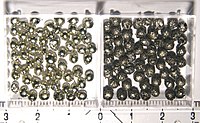
Photo from wikipedia
Abstract The mechanical properties of high-entropy alloys (HEAs) strongly depend on their microstructural features. In this work, the phase formation and morphologies of Fe26.7Co26.7Ni26.7Si8.9B11.0 HEAs fabricated under different undercooling levels… Click to show full abstract
Abstract The mechanical properties of high-entropy alloys (HEAs) strongly depend on their microstructural features. In this work, the phase formation and morphologies of Fe26.7Co26.7Ni26.7Si8.9B11.0 HEAs fabricated under different undercooling levels by the drop tube technique together with subsequent quenching were investigated in detail. It was found when the droplet size decreases (i.e. the increase of the undercooling level), the grain refinement is easily achieved without any phase transformation for the present hypoeutectic HEA which is composed of the fcc dendrites and eutectic structure. After quenching under large undercooling levels, the liquid should be deeply undercooled into an asymmetric couple zone, leading to the primary formation of eutectic structure and the subsequent precipitation of the fcc dendrites. The direct product of rapid solidification after deep undercooling and subsequent recalescence may induce the decoupled eutectic growth, resulting in a transition from the regular into anomalous eutectic structures. Furthermore, the volume fractions of the eutectic structures and the fcc dendrites increase and decrease with decreasing droplet size, respectively. As a result, the Vickers hardness gradually increases with decreasing droplet size, which exhibits a linear relationship with the volume fraction of eutectic matrix. The present study may provide a simple way to tailor microstructures and mechanical properties of HEAs.
Journal Title: Intermetallics
Year Published: 2020
Link to full text (if available)
Share on Social Media: Sign Up to like & get
recommendations!